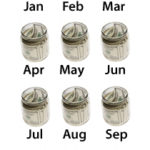Have you heard the term Cap Rate? Maybe by the water cooler? Maybe in an investment book? Maybe on a late night sales commercial? Have you ever wondered what it means or how reliable it is?
When buying an investment property, investors often consider the cap rate. Often it serves as a part of the process but not the one and only component when evaluating a property.
Figuring the Capitalization Rate (a.k.a. ‘Cap Rate’)
Annual Cash Flow / Cost (or property value) = Capitalization Rate
Annual Cash Flow is Gross Income – Fixed and Variable Expenses. It does not take into consideration any debt service (the mortgage payment).
Here’s a quick example (via Wikipedia):
For example, if a building is purchased for $1,000,000 sale price and it produces $100,000 in positive net cash flow (the amount left over after fixed costs and variable costs are subtracted from gross lease income) during one year, then:
$100,000 / $1,000,000 = 0.10 = 10%
Your capitalization rate is 10%.
The cap rate comes most in handy when trying to figure out how quickly you’ll get your investment will pay for itself. If you have a 10% cap rate, it’ll take 10 years. With a 5% cap rate, it’ll take 20 years. Make sense?
My Opinion:
Here’s my beef with cap rates.. It doesn’t take into consideration any debt service. Most people I know use leverage (other peoples money). If you’re leveraging someone else’s money, it’s a variable cost. Depending on the terms you can get, it could make or break the numbers on a deal. This is why I personally believe that a capitalization rate is a decent way to evaluate a property, but honestly – there are too many other variables to just look at this one evaluation technique.
In the coming weeks, I’ll discuss other technique’s used to crunch the numbers on investment properties just to beef up your arsenal. I’ll be the first person to tell you that if the numbers work – you take the deal. If not – walk away. Most importantly, build a team of professionals you trust that can help you protect your investment and manage it over time.











{ 2 comments… read them below or add one }
I recently came accross your blog and have been reading along. I thought I would leave my first comment. I dont know what to say except that I have enjoyed reading. Nice blog.
Tim Ramsey
Tim,
Thanks for your readership!
If you ever see any stories where you want to join the conversation, please do.